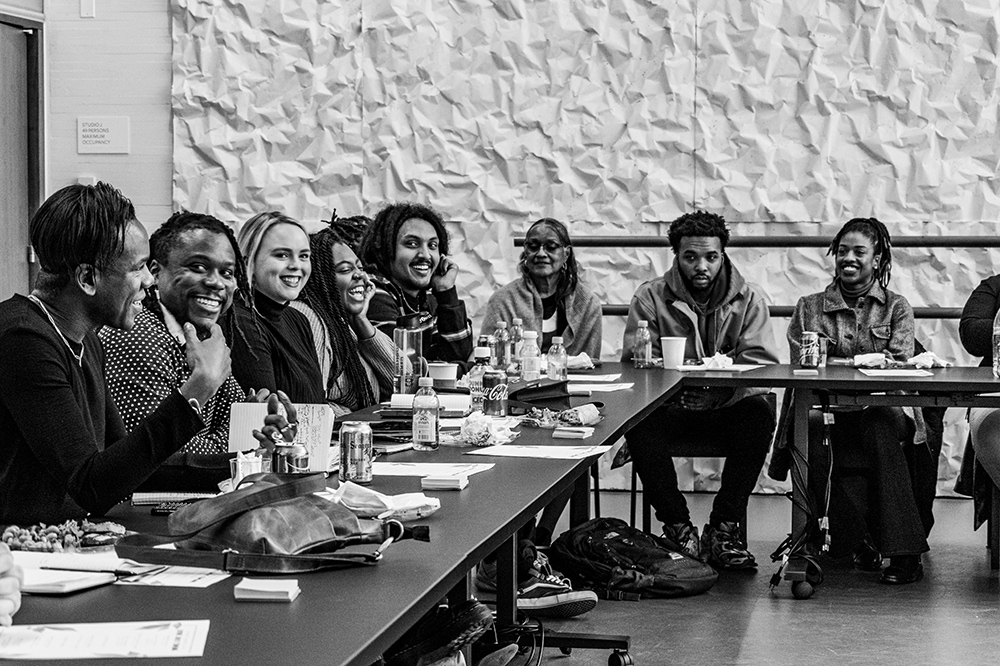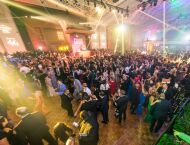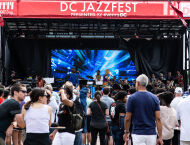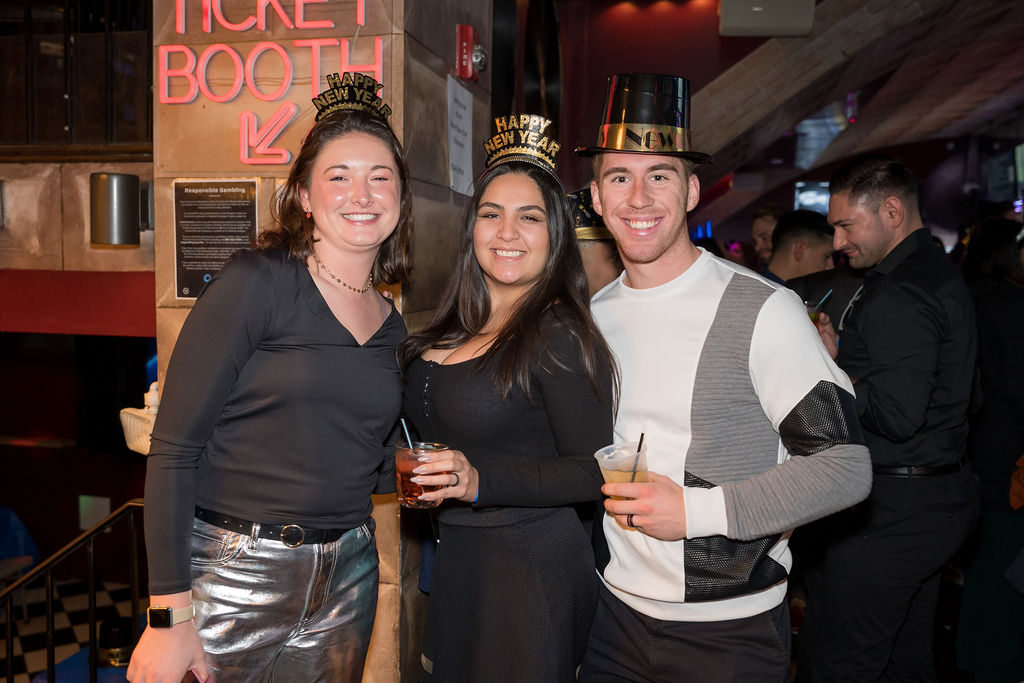Culture
 Members of the Kennedy Center Culture Caucus during a meeting in early 2020. Photo by D. Lee.
Members of the Kennedy Center Culture Caucus during a meeting in early 2020. Photo by D. Lee.
The Kennedy Center’s Social Impact Initiatives Resonate + Reverberate
December 11, 2020 @ 1:00pm
“Like an orchid, I felt myself slowly bending my body in half. The top of my head was like an antenna that pointed toward the drums. I realized how much I missed that feeling of someone getting free in front of you, and what that does.”
Marc Bamuthi Joseph is waxing poetic about how fiercely he misses live music, and the visceral impact of seeing jazz pianist and producer Robert Glasper perform in front of several dozen audience members this fall at the Kennedy Center’s Opera House. It was the drum solo during Glasper’s show that transported Joseph to another time and place, when live performances were the very fabric of the Kennedy Center’s connection to the local community.
“Live performance isn’t just about your ability to execute on or with your instrument,” he says. “It’s about the orchestration of energy. It’s what happens to the molecules in the room when an amazing performer breaks through physics and biology and creates something almost alien. Not only is that the kind of magic of live performance that we’re attracted to, but it’s also a core place for a lot of artists who do this for a living.”
As the Kennedy Center’s vice president and artistic director of social impact, Joseph has spent the past nine months rethinking how to cultivate a sense of community based on the impact-driven principles and ideals behind the center’s cultural leadership. While he had laid the groundwork pre-Covid for robust social impact programming, alongside Kennedy Center President Deborah Rutter and other likeminded colleagues, everything changed course, and in many ways, picked up momentum in 2020.
From late July to early December, the center offered free digital programming through the Arts Across America program on an almost daily basis that acted as a virtual stand-in for its popular Millennium Stage performances. The program was specifically created to “uplift artists and showcase art from communities and regions across the country in this extraordinary time of uncertainty, due to a global pandemic, and unrest, as the nation also faces its history of systemic racism and oppression.”
This summer, the center also launched the Culture Caucus, a curated group of 20-30 individuals and organizations in the D.C. area operating essentially as a community artists-in-residence program, and Office Hours, mini-residencies offering artists a six-day opportunity to develop work and perform at the national cultural center. Both initiatives give artists access to the REACH, the Kennedy Center’s year-old campus expansion designed to facilitate shared artistic experiences for the community.
Rutter says that while these programs are not mainstage or big platform activities, they’re actually getting more of the spotlight this year because the center’s larger-scale productions and big Broadway touring projects have been put on hold due to the pandemic.
“We’ve been focusing really intensively on our local community here in D.C., which, frankly, the Kennedy Center has not always done a really great job of,” she says candidly. “We have been working really, really hard to celebrate and support local artists, local grassroots artists, and local and grassroots arts organizations to be a good partner.
When you take [away] that which garners a lot of attention, it reminds you there is an ongoing level of activity bubbling along that is now getting more attention.”
She says her and Joseph’s dedication to the issues of equity and diverse programming has propelled the social impact initiatives launched earlier this year, but this work has been deeply rooted in the center’s DNA for a long time.
“This is work we have been doing and caring about. You’re talking to a girl who as a volunteer in the ‘80s was taking music to low-income neighborhoods, and helping to keep girls from getting pregnant by learning how to play the violin. This is something I’ve cared about my entire professional career. It’s just that now, we have reached that tipping point where people are really paying attention.”
The tipping point Rutter is referring to is the unconscionable murders of Ahmaud Arbery, Breonna Taylor, George Floyd and many others, forcing systemic racism to the forefront of our nation’s collective consciousness this summer. That, coupled with the crushing effects of the pandemic, gave a stronger sense of purpose to the Kennedy Center’s impact-driven programming.
“The entire country experiencing this dual crisis – one virological and one cultural – opened up space within the Kennedy Center to go from poetry to prose to something more urgent than either of those things,” Joseph says. “How do we begin to embody the kind of place that combats a cultural landscape and philosophical environment in which that kind of hatred could exist and survive? How do we move beyond words?”
He says the center calling itself an anti-racist organization wasn’t enough.
“We’re so far from [achieving] that because of how deeply layered and scaffolded racism is in the fabric of America.”
He’s encouraged Kennedy Center leaders to think about anti-Blackness as something they are consistently, proudly and actively combating.
“If we do think racism is structural [and] systemic, then our goal has to be to build systems that counteract or serve as some kind of cultural counterbalance to a landscape of defensiveness and prejudice. These are the things that we had to integrate into the organization in a more profound and urgent way. That is where you find us today.”
Rutter says the center’s social impact initiatives are about supporting storytelling that hasn’t always been told, and artists who haven’t always been center stage, by weaving thematic concepts through every facet of their programming.
“These are really important ways you can change behavior,” she notes. “If we’re looking to eradicate racism, then [we have to take] this systemic approach to incorporating [these messages] throughout all of our work. I’m really proud of the way my team has embraced this.”
While Rutter did put an impetus on in-person opportunities for the community this summer and fall, all complying with Covid guidelines, of course, those have been temporarily put on hold due to the mayor’s new restrictions for the city. But she’s confident in the center’s ability to reintroduce these activities to the public in a safe way when the numbers stop spiking.
“Our operations team has been having conversations at the highest level across the country about how to have safe buildings and safe activities, and establish protocols,” she says. “[We] have been in consultation with physicians, epidemiologists and scientists, and we contracted with
the Cleveland Clinic to help us establish specific guidelines. We have been able to benefit from extraordinary expertise that gives us confidence about the events and gatherings we can host.”
In the meantime, Joseph says the center has been offering a very healthy slate of programming. He notes a recent hybrid meeting of the Culture Caucus where some artists joined digitally, and some joined in person at the REACH after the center arranged for rapid Covid testing.
“They were very clear that they wanted to have more of a say in terms of certain directions the Kennedy Center was taking. They assumed a different level of agency far beyond what I would have thought or hoped for, so that’s dope.”
He also mentions a 2018 collaboration with the Apollo Theater on an adaptation of Ta-Nehisi Coates’ book “Between the World and Me” as an example of transforming thought leadership into curated content. The Kennedy Center produced a panel to accompany the film special, available on HBO this month, which Joseph sees as one of many opportunities to engage audiences in a new way.
“That’s the kind of impact we’re seeking to have: a little bit smaller, much more directed and certainly limited by the strictures of Covid in terms of how many people we can gather. But, [we’re] seeking a deeper impact [and] more intimate relationship. We are doing more than programming concerts. We’re producing, processing and developing relationships in ways we haven’t always been as successful in doing.”
He’s still quick to be honest about the deficits of working for a performing arts institution mid-pandemic.
“It’s hard, man. Our gig is to bring people together. That’s the mandate.”
Opportunities like curating a several-day series specifically for frontline workers and first responders that included movie screenings, performances and meals courtesy of the center’s beer and wine garden Victura Park might have to be put on hold, but Joseph and Rutter have both proven spry and resilient in their pivots.
In the next few months, and for the foreseeable future, Joseph says he anticipates a continuing shift for the center to the foreground of cultural leadership as a creative enterprise.
“All I want is for artists to be positioned as leaders as we collectively undergo a moment of national healing. On the far horizon, as we do feel comfortable getting back in public spaces together again, I just cannot wait to see live music and feel that feeling with others. The patience, the intelligence, the discipline and the resilience [needed] to get there – that’s what places like the Kennedy Center can do. We can be a bridge to that place of a more healed soul and psyche.”
Learn more about the Kennedy Center’s social impact initiatives, including Arts Across America, the Culture Caucus and Office Hours, at www.kennedy-center.org/our-story/social-impact. Follow the center on Instagram and Facebook @kennedycenter and on Twitter at @kencen, and check their website for regular updates on community-focused digital programming available this winter.
The John F. Kennedy Center for the Performing Arts: 2700 F St. NW, DC; 202-467-4600; www.kennedy-center.org
Enjoy this piece? Consider becoming a member for access to our premium digital content. Support local journalism and start your membership today.








